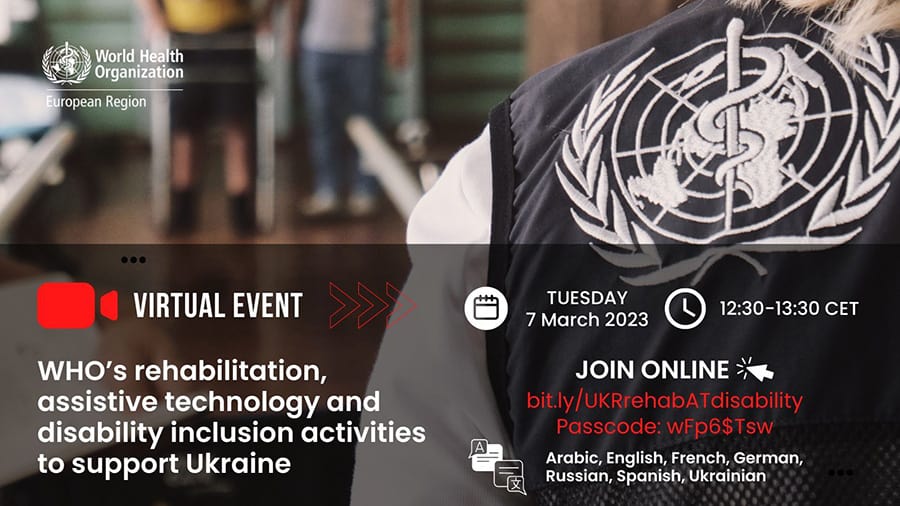Upcoming online event will explore use of assistive tech during Ukraine war

WHO/Europe, the WHO Country Office in Ukraine, and the Ministry of Health of Ukraine are hosting an online event next week underlining urgent issues: people’s rehabilitation needs, disability inclusion, and the use of assistive technology in the context of the health response to the ongoing war.
Participants will include World Health Organization (WHO) experts, rehabilitation experts, and representatives from the Ministry of Health of Ukraine and the Office of the President of Ukraine. They will discuss how WHO and health authorities have been collaborating in this critical area since the outbreak of war on 24 February 2022.
The event will take place online from 11.30am-12.30pm GMT on 7 March. Interested delegates can join the event for free here using the passcode wFp6$Tsw.
Event topics include WHO’s work related to law, policy, and service provision in the context of the war in Ukraine; WHO’s rehabilitation, assistive technology, and disability inclusion strategy; and WHO’s partnerships and collaborations with international and local organisations, and key ministries.
Speakers at the event next week include Ms Iuliia Sokolovska, Deputy Head, Office of the President of Ukraine; Dr Viktor Liashko, Minister of Health of Ukraine; Dr Volodymyr Golyk, National Professional Officer, Disability and Rehabilitation, WHO Country Office in Ukraine; and Ms Tatiana Baryshok, Physical Therapist, Khortytsya National Rehabilitation Academy, Ukrainian Association of Physical Therapists.
See the full list of speakers on this page.
In the midst of the ongoing war in Ukraine, WHO is stepping up its efforts to support health authorities in strengthening rehabilitation and assistive technology services to enhance disability inclusion in the country.
Before the war, over 2.7 million people in Ukraine were registered as living with disabilities, but this number has likely increased amid the violence, according to the organisation. Thousands of people with complex conflict-related injuries require short-term and long-term rehabilitation services.
At the same time, the need for rehabilitation for issues not directly related to the war, such as noncommunicable diseases, ageing, or accidents, also continues.
Many people in Ukraine rely on assistive technologies, WHO highlights, which may get damaged or left behind during evacuations. Disruptions to public transport and unstable electricity and water supply due to attacks against critical infrastructure also hinder the functioning of hospitals and citizens’ access to health care.
To assist in this area, WHO has been delivering essential assistive technologies across Ukraine during the conflict, with the support of international partners and governments, providing rehabilitation and assistive technology services.
Besides targeted interventions, WHO is working closely with the relevant ministries in Ukraine to achieve rapid systemic changes through policy work.
WHO has also been working with Ukraine’s Ministry of Health to implement a project to provide internally displaced persons in the country with vital assistive technologies.
Specialised AT10 kits have been procured and distributed throughout Ukraine. Each kit contains 10 types of assistive products identified as most needed by Ukrainians in emergencies. The kits include mobility aids, such as crutches, wheelchairs with pressure relief cushions, walking sticks, and walking frames, and self-care products, such as catheter kits, absorbent continence products, and toilet and shower chairs.

